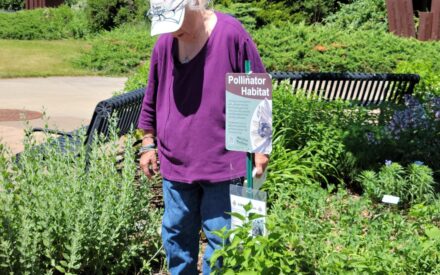Community gardens provide a variety of learning opportunities and foster multiple societal benefits including environmental stewardship, social capital, food security, and civic engagement. When community gardens are viewed solely through the lenses of food production or healthy food access, Extension and its partners miss opportunities to understand and amplify other direct and indirect impacts that contribute to individual and community well-being.
In response, Extension supports community gardens in 32 of Wisconsin’s 72 counties. Our educators and staff provide community gardens with administration and oversight, such as managing plot rental programs and volunteers. Extension provides technical assistance in the form of tillage, plant disease diagnostics, and guidance on starting gardens. Extension supports community gardens with management and developing partnerships with other community-based organizations. Extension also provides direct programming such as nutrition education, garden-based youth education, and volunteer development. As a result, Extension contributes to a variety of benefits for gardeners, partner organizations, and the community more broadly. For example, we improve knowledge about vegetable production and increase access to affordable agricultural plots, especially for immigrant growers. Indirect outcomes (self-reported by gardeners via evaluations) include physical, dietary, and mental health benefits, strengthened social networks, and new pathways for entrepreneurship, among others.
In Milwaukee County, Extension operates the most extensive community garden and urban agriculture program in the state. The gardens contain 2,500 garden plots, and members from close to 800 households grow food on 80 acres of land. Over 130 gardeners donate food grown on the plots to feed over 2,400 people. Here, like in other regions, Extension provides a variety of garden-based education for youth, hobby gardeners, veterans, and others. It also plays an important role in managing and maintaining nearly a dozen community gardens across the county, including operating an extensive plot rental program.
Focus groups and interviews confirmed a variety of positive impacts associated with community gardening. Gardeners reported growing food as a way to eat well on a limited income and noted that in the absence of the garden space and their own labor, they would not be able to eat as healthily as they do. They also mentioned that through gardening they have access to culturally important ingredients they could not otherwise access. Others mentioned that their hobby-gardening experiences helped them realize that they had the knowledge and skills to grow at a larger scale for commercial applications. Gardeners also underscored the importance of the gardens for their mental health; the gardens provided therapeutic spaces for specific audiences, such as veterans who used the gardens for both production and as a meeting space. Gardeners described the gardens as a “community,” a “knowledge exchange and support system,” and “a family.” In sum, our qualitative evaluation indicated that gardeners experienced a wide range of individual and community-level benefits from participating in Extension-supported community gardens and garden-related programming.
Extension helps grow community gardens through education, networking, technical assistance, and management support.
The Community Food Systems program is part of Extension’s Community Development Institute. Learn more by visiting foodsystems.extension.wisc.edu.





